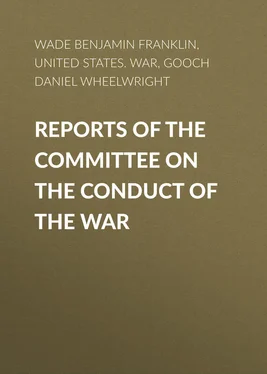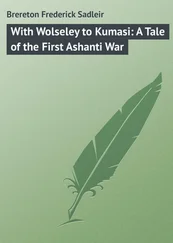Benjamin Wade - Reports of the Committee on the Conduct of the War
Здесь есть возможность читать онлайн «Benjamin Wade - Reports of the Committee on the Conduct of the War» — ознакомительный отрывок электронной книги совершенно бесплатно, а после прочтения отрывка купить полную версию. В некоторых случаях можно слушать аудио, скачать через торрент в формате fb2 и присутствует краткое содержание. Жанр: История, foreign_antique, foreign_prose, на английском языке. Описание произведения, (предисловие) а так же отзывы посетителей доступны на портале библиотеки ЛибКат.
- Название:Reports of the Committee on the Conduct of the War
- Автор:
- Жанр:
- Год:неизвестен
- ISBN:нет данных
- Рейтинг книги:3 / 5. Голосов: 1
-
Избранное:Добавить в избранное
- Отзывы:
-
Ваша оценка:
- 60
- 1
- 2
- 3
- 4
- 5
Reports of the Committee on the Conduct of the War: краткое содержание, описание и аннотация
Предлагаем к чтению аннотацию, описание, краткое содержание или предисловие (зависит от того, что написал сам автор книги «Reports of the Committee on the Conduct of the War»). Если вы не нашли необходимую информацию о книге — напишите в комментариях, мы постараемся отыскать её.
Reports of the Committee on the Conduct of the War — читать онлайн ознакомительный отрывок
Ниже представлен текст книги, разбитый по страницам. Система сохранения места последней прочитанной страницы, позволяет с удобством читать онлайн бесплатно книгу «Reports of the Committee on the Conduct of the War», без необходимости каждый раз заново искать на чём Вы остановились. Поставьте закладку, и сможете в любой момент перейти на страницу, на которой закончили чтение.
Интервал:
Закладка:
Answer. No, sir; but I heard them shooting. I hid myself in the bushes before the next morning. I left a fellow lying there, and they came down and killed him during the night. I went down there the next morning and he was dead.
Question. Did you see any of our folks buried by the rebels?
Answer. No, sir.
Question. Did you see any buildings burned up?
Answer. Yes, sir; most all were burned up.
Question. Were any persons in them when they were burned?
Answer. I heard so. I went to the quarters and staid about a house there. One of the rebels told me that he should take me out the next morning and kill me. He went out and I slipped out into the bushes, and laid there until the gunboat came. I saw them take the quartermaster; they said, "Here is one of our men; let us take him up and fix him." A white man told me the next day that they burned him.
Question. Was he wounded?
Answer. No, sir; he walked right straight. He had three stripes on his arm. I knew him well; I worked with him. He was a small fellow, weak and puny.
Sandy Cole, (colored,) private, company D, 6th United States heavy artillery, sworn and examined.
By Mr. Gooch:
Question. Where were you born?
Answer. In Tennessee.
Question. Have you been a slave?
Answer. Yes, sir.
Question. Were you at Fort Pillow at the late fight there?
Answer. Yes, sir.
Question. When were you wounded?
Answer. After I started down the hill, after the surrender. They shot me through the thigh and through the arm.
Question. Who shot you?
Answer. A secesh private.
Question. How near was he to you?
Answer. About ten feet.
Question. Did he say anything to you?
Answer. No, sir. I went to the river and kept my body in the water, and my head under some brush.
Question. Did you see anybody else shot?
Answer. Yes, sir; I saw some of them shot right through the head.
Question. How many did you see shot?
Answer. Some seven or eight.
Jacob Thompson, (colored,) sworn and examined.
By Mr. Gooch:
Question. Were you a soldier at Fort Pillow?
Answer. No, sir, I was not a soldier; but I went up in the fort and fought with the rest. I was shot in the hand and the head.
Question. When were you shot?
Answer. After I surrendered.
Question. How many times were you shot?
Answer. I was shot but once; but I threw my hand up, and the shot went through my hand and my head.
Question. Who shot you?
Answer. A private.
Question. What did he say?
Answer. He said, "God damn you, I will shoot you, old friend."
Question. Did you see anybody else shot?
Answer. Yes, sir; they just called them out like dogs, and shot them down. I reckon they shot about fifty, white and black, right there. They nailed some black sergeants to the logs, and set the logs on fire.
Question. When did you see that?
Answer. When I went there in the morning I saw them; they were burning all together.
Question. Did they kill them before they burned them?
Answer. No, sir, they nailed them to the logs; drove the nails right through their hands.
Question. How many did you see in that condition?
Answer. Some four or five; I saw two white men burned.
Question. Was there any one else there who saw that?
Answer. I reckon there was; I could not tell who.
Question. When was it that you saw them?
Answer. I saw them in the morning after the fight; some of them were burned almost in two. I could tell they were white men, because they were whiter than the colored men.
Question. Did you notice how they were nailed?
Answer. I saw one nailed to the side of a house; he looked like he was nailed right through his wrist. I was trying then to get to the boat when I saw it.
Question. Did you see them kill any white men?
Answer. They killed some eight or nine there. I reckon they killed more than twenty after it was all over; called them out from under the hill, and shot them down. They would call out a white man and shoot him down, and call out a colored man and shoot him down; do it just as fast as they could make their guns go off.
Question. Did you see any rebel officers about there when this was going on?
Answer. Yes, sir; old Forrest was one.
Question. Did you know Forrest?
Answer. Yes, sir; he was a little bit of a man. I had seen him before at Jackson.
Question. Are you sure he was there when this was going on?
Answer. Yes, sir.
Question. Did you see any other officers that you knew?
Answer. I did not know any other but him. There were some two or three more officers came up there.
Question. Did you see any buried there?
Answer. Yes, sir; they buried right smart of them. They buried a great many secesh, and a great many of our folks. I think they buried more secesh than our folks.
Question. How did they bury them?
Answer. They buried the secesh over back of the fort, all except those on Fort hill; them they buried up on top of the hill where the gunboats shelled them.
Question. Did they bury any alive?
Answer. I heard the gunboat men say they dug two out who were alive.
Question. You did not see them?
Answer. No, sir.
Question. What company did you fight with?
Answer. I went right into the fort and fought there.
Question. Were you a slave or a free man?
Answer. I was a slave.
Question. Where were you raised?
Answer. In old Virginia.
Question. Who was your master?
Answer. Colonel Hardgrove.
Question. Where did you live?
Answer. I lived three miles the other side of Brown's mills.
Question. How long since you lived with him?
Answer. I went home once and staid with him a while, but he got to cutting up and I came away again.
Question. What did you do before you went into the fight?
Answer. I was cooking for Co. K, of Illinois cavalry; I cooked for that company nearly two years.
Question. What white officers did you know in our army?
Answer. I knew Captain Meltop and Colonel Ransom; and I cooked at the hotel at Fort Pillow, and Mr. Nelson kept it. I and Johnny were cooking together. After they shot me through the hand and head, they beat up all this part of my head (the side of his head) with the breech of their guns.
Ransom Anderson, (colored,) Co. B, 6th United States heavy artillery, sworn and examined.
By Mr. Gooch:
Question. Where were you raised?
Answer. In Mississippi.
Question. Were you a slave?
Answer. Yes, sir.
Question. Where did you enlist?
Answer. At Corinth.
Question. Were you in the fight at Fort Pillow?
Answer. Yes, sir.
Question. Describe what you saw done there.
Answer. Most all the men that were killed on our side were killed after the fight was over. They called them out and shot them down. Then they put some in the houses and shut them up, and then burned the houses.
Question. Did you see them burn?
Answer. Yes, sir.
Question. Were any of them alive?
Answer. Yes, sir; they were wounded, and could not walk. They put them in the houses, and then burned the houses down.
Question. Do you know they were in there?
Answer. Yes, sir; I went and looked in there.
Question. Do you know they were in there when the house was burned?
Answer. Yes, sir; I heard them hallooing there when the houses were burning.
Question. Are you sure they were wounded men, and not dead, when they were put in there?
Answer. Yes, sir; they told them they were going to have the doctor see them, and then put them in there and shut them up, and burned them.
Question. Who set the house on fire?
Answer. I saw a rebel soldier take some grass and lay it by the door, and set it on fire. The door was pine plank, and it caught easy.
Читать дальшеИнтервал:
Закладка:
Похожие книги на «Reports of the Committee on the Conduct of the War»
Представляем Вашему вниманию похожие книги на «Reports of the Committee on the Conduct of the War» списком для выбора. Мы отобрали схожую по названию и смыслу литературу в надежде предоставить читателям больше вариантов отыскать новые, интересные, ещё непрочитанные произведения.
Обсуждение, отзывы о книге «Reports of the Committee on the Conduct of the War» и просто собственные мнения читателей. Оставьте ваши комментарии, напишите, что Вы думаете о произведении, его смысле или главных героях. Укажите что конкретно понравилось, а что нет, и почему Вы так считаете.












